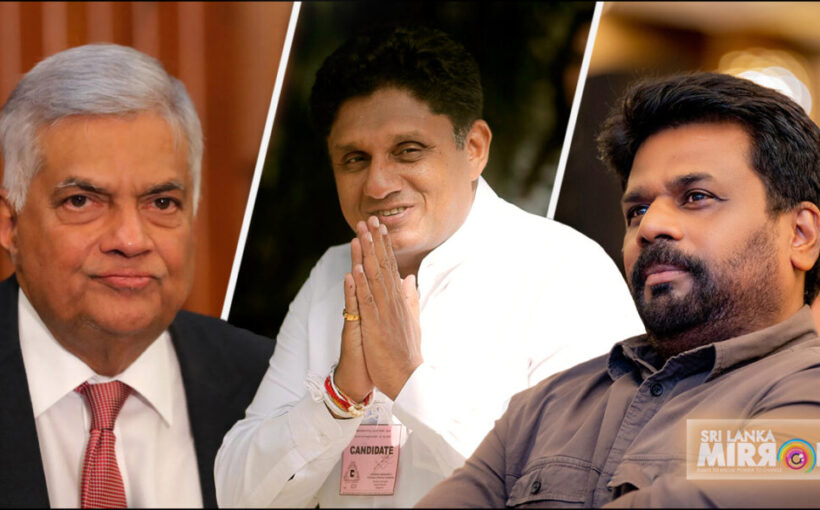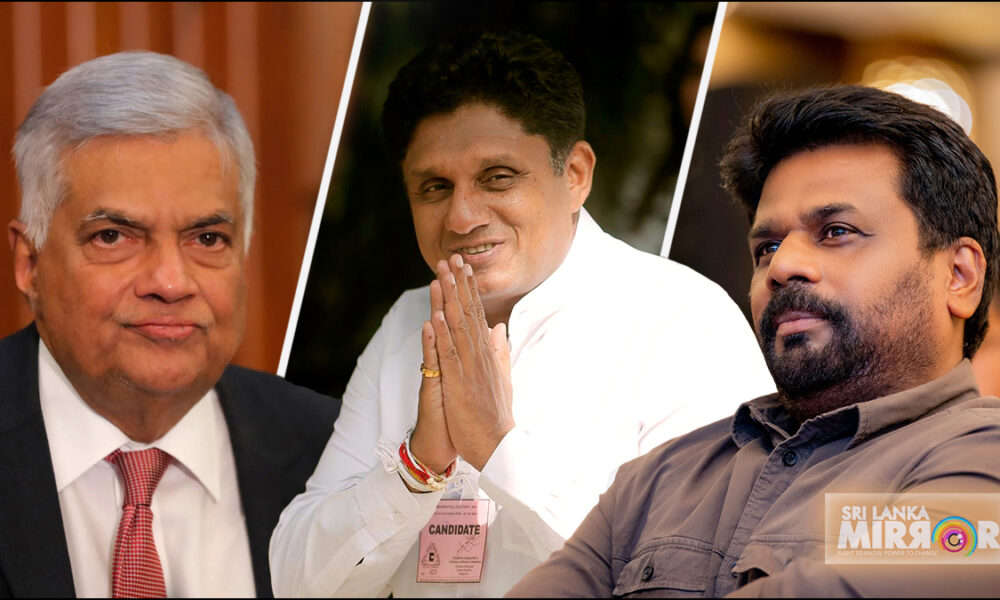By P.K.Balachandran
Colombo, September 8: Sri Lankan President, Ranil Wickremesinghe, who is standing as an “Independent” in the September 21 Presidential election, is highlighting the way he led Sri Lanka’s recovery from the unprecedented economic crisis it went through in 2022.
Wickremesinghe decided to be a “non-partisan” or a “unifying” candidate and appeal for votes solely on the strength of his achievements in the last two years when he shepherded a distraught nation from despair to an era of hope if not prosperity.
But his two principal rivals, Sajith Premadasa of the Samagi Jana Balawegaya (SJB) and Anura Kumara Dissanayake of the National Peoples’ Power (NPP) are seriously challenging his claims, highlighting the common man’s inability to bear a situation in which he has to pay high prices and high taxes without an increase in his earnings. At the ground level, the economy is still sluggish despite improvement in macro parameters.
Such a situation makes the September election a close contest in which Wickremesnghe could meet his match in the younger, more radical and more charismatic Dissanayake. The popular view is that greenhorn Dissanayake could pip old war horse Wickremesinghe to the post.
Economic Crisis
In 2022, Sri Lankans experienced power cuts and shortages of essential commodities such as food and fuel. Inflation hit 50%. Protests broke out in April as serpentine queues formed at cooking gas and petrol stations. Schools shut and office goers were asked to work from home.
According to the BBC, Sri Lanka imported US$ 3 billion more than it exported, running out of foreign exchange. In 2019, it had US$ 7.6 billion in forex reserves, which dwindled to US$ 250 million. COVID was cause but mismanagement and bad policies were the major factors.
In April 2022, for the first time in Sri Lankan history, the Gotabaya Rajapaksa government decided to default on repayment of foreign loans which totalled more than US$ 83 billion.
And in June, following massive protests, Gotabaya Rajapaksa fled and resigned from exile. In July, acting President Ranil Wickremesinghe was made President by parliament. Using Emergency provisions, he restored order and began reviving the moribund economy.
India, US, China and the Paris Club collaborated to see that the IMF sanctioned a bailout of US$ 3 billion. The World Bank pledged another US$ 600 million. India pumped in US$ 4.5 billon to restore supplies of essentials.
In 2023, as part of the IMF reform program, Sri Lanka introduced income taxes for higher earners, ranging from 12.5% to 36%. It also raised other taxes to pay for critical purchases.
The Election
A record 39 candidates are running in the September 21 election. However, only three of them are serious contenders. These are, sitting President Ranil Wickremesinghe (Independent), Sajith Premadasa of Samagi Jana Balawegaya (SJB), and Anura Kumara Dissanayake of the National Peoples’ Power (NPP) an alliance led by the ultra-leftist/nationalist Janatha Vimukthi Peramuna (JVP).
Namal Rajapaksa, the eldest son of former President Mahinda Rajapaksa, is also in the fray as the candidate of the Sri Lanka Podujana Peramuna (SLPP). But he is neither expected to win nor to make a significant dent in the votes of others. He is politically raw, and the SLPP is in steep decline.
More than 17 million people are eligible to vote. The winner will have to be get 50% plus of the valid votes cast. If no candidate gets 50% plus, the second preference votes are counted. When even then, no candidate gets 50% plus, the third preference votes are counted. Each voter indicates his first, second and third choice, on the ballot paper.
Ranil Wickremesinghe
Ranil Wickremesnghe (75) is the most experienced, best educated, and the oldest of the top candidates. He was Prime Minister five times, though never for a full term. He has held key ministries like Education, Science and Technology and Industry. And as President, he has held the Defence and Finance portfolios.
But Wickremesinghe has no talent for mass mobilisation or party building. After the defeat and disintegration of his United National Party (UNP) in the 2020 election, he became a nominated MP and was finally elected President by parliament. After becoming President, he did not care to rebuild his shattered party. This is the real reason for his decision to stand as an “Independent.”
The present election is seen as a referendum on Wikremesinghe’s economic reforms and his governance. On the upside, inflation dropped to about 5.9% from 70% in 2022. The economy expanded in the fourth quarter of 2023 by 4.5%, the IMF said.
Interest rates also dropped, the rupee rebounded, foreign reserves increased. Creditor countries such as India, Japan and France, agreed to defer debt repayments until 2028, giving Sri Lanka space to rebuild its economy.
With Presidential elections due in September 2024, Wickremesinghe brought down power tariffs by 22.5% which should have led to a reduction in the prices of goods by 20% if the traders cooperated.
The downside is that people, especially in the urban areas, are bitterly complaining of high prices and taxes. In an article dated September 13, 2023 published by Project Syndicate, Professors Jayati Ghosh and Kanchana N. Ruwanpura pointed out that the IMF had pledged only US$ 3 billion over four years. It is a “tiny fraction of what the country needs to meet its debt-servicing requirements and just one-sixth of its foreign-exchange earnings, which amounted to roughly US$18 billion in 2022.”
The IMF imposed a series of conditions that significantly exacerbated Sri Lanka’s cost-of-living crises, the authors said. The mandated shift to market exchange rates, in particular, immediately led to a sharp currency devaluation, causing imported fuel and food prices to skyrocket and contributing to a 165% increase in electricity tariffs between June 2022 and February 2023, Ghosh and Ruwanura said.
“As fiscal restraints were imposed, the economy continued to spiral down, with GDP shrinking by 7.8% in 2022 and 11.5% in the first quarter of 2023. This has had an adverse impact on employment, livelihoods, and the viability of small and medium-size enterprises.”
“Consequently, real wages fell by 30-50% in 2022 and have remained stagnant. Although it includes a modest increase in corporate income taxes, it neglects the possibility of imposing wealth taxes,” the authrs added.
Wealth tax is a levy on the total value of a person’s assets, as opposed to taxes on their income, real estate, or asset sales. Wealth tax is a way of moderating extreme wealth inequality. Leftists complain that Wickremesinghe has let the wealthy off the hook while squeezing the poor.
Value-Added Tax was raised to 18%. Thus, the bulk of additional revenues were generated through indirect taxes that disproportionately affected ordinary people.
By reducing the interest rates on sovereign bonds held by Sri Lanka’s largest pension funds (EPF) from more than 20% to 12%, and then to 9% from 2025 until maturity, the government aimed to reduce its interest burden by 0.5 percentage points of GDP annually.
Recent estimates by economist Ahilan Kadirgamar suggest that this will result in a 30% decline in the value of retirement funds a decade from now. Moreover, these pension funds, often holding the only financial assets of working people, will be subject to a 30% tax on their returns – higher than the tax rate applied to many in the corporate sector, Ghosh and Ruwanpura pointed out.
Rural-Urban Divide
However, there could be a rural-urban differential in the economic impact of the reforms. Rural folk have gained by the import of diesel and petrol with the US$ 4.5 billion given by India and the dollars from the IMF. The removal of the ban on chemical fertilizers was a boon to the farmers.
Moreover, rural folk do not feel the pinch of high prices as much as the urbanites do, because they do not buy food with cash as urban workers and office goers to do on a daily basis. Nor do they use public or private transport on a daily basis.
However, there is a school of thought which says that there is no clear distinction between rural and urban people in Sri Lanka as inequalities are not as sharp as in other countries in South Asia. Many families have one foot in an urban area and the other in a rural area.
Premadasa and Dissanayake
Wickremesinghe’s challengers Sajith Premadasa and Anura Kumara Dissanayaka have said that they will renegotiate some of the aspects of the IMF deal to benefit the poor. But Wickremesinghe has warned that any bid to amend the IMF deal could adversely affect ties with India, China and the Paris Club of creditors, the US, and international lending agencies. The horrible shortages might return.
The Presidential election is also a contest between administrative experience and inexperience. In contrast to Wickremesinghe, both Premadasa and Dissanayake lack political and administrative experience. So far, Premadasa has only held the portfolio of Housing which is a minor ministry in Sri Lanka. Dissanayake has no administrative experience whatsoever. As a Leftist, he has been an agitator and an MP all his political life.
While Dissanayake is a charismatic leader, neither Premadasa nor Wickremesinghe is. As a non-doctrinaire and up and coming right wing politician, Premadasa might seek validation from the West and be amenable to them. But Dissanayake is just the opposite. He is a Marxist and ideologically anti-West and pro-China. As a staunch Sri Lankan nationalist, he will fight perceived encroachments by external powers.
As the leader of the Sinhalese nationalist Janatha Vimukthi Peramuna (JVP), the main party in his alliance NPP, Dissanayake has been anti-India right through. While releasing his manifesto, he spoke about how Sri Lanka’s consumer goods market is dominated by Indian products and how it is necessary end it. He followed this up by saying that the giant oil tanks at Trincomallee given to India by a bilateral agreement in the 1980s will be given to a consortium of foreign entities through a tender.
Since Dissanayake is pro-China, Beijing may expect him to revive the uncompleted US$ 1.4 billion Chinese-aided Colombo Port City project. Dissanayake will have the unenviable task of coaxing Indian and Western companies to invest in it to make it an international hub.
END
The post Bread and butter issues dominate Lankan Presidential election campaigns appeared first on NewsIn.Asia.




